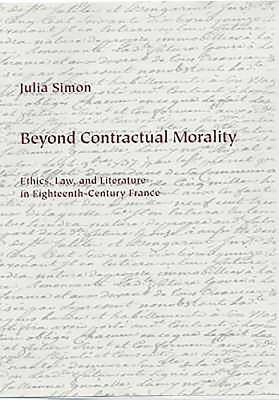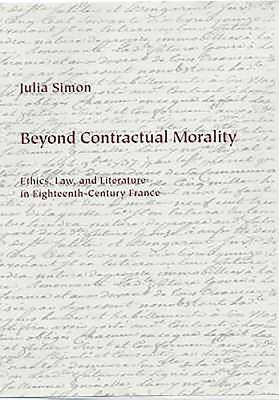
- Retrait gratuit dans votre magasin Club
- 7.000.000 titres dans notre catalogue
- Payer en toute sécurité
- Toujours un magasin près de chez vous
- Retrait gratuit dans votre magasin Club
- 7.000.0000 titres dans notre catalogue
- Payer en toute sécurité
- Toujours un magasin près de chez vous
Beyond Contractual Morality
Ethics, Law, and Literature in Eighteenth-Century France
Julia Simon
Livre relié | Anglais
118,95 €
+ 237 points
Description
Beyond Contractual Morality looks at current debates over the meaning of liberalism by reexamining their roots in eighteenth-century texts, which demonstrate the historical intertwining of political, legal and moral problems in their extension of social contract theory into various realms of public and private lives. Writers such as Rousseau, Voltaire, Sade, and Montesquieu are discussed. In light of contemporary debates over liberalism, and informed by the problems of contemporary democratic, pluralistic culture, Beyond Contractual Morality reexamines the roots of these current discussions in eighteenth-century texts. Enlightenment texts demonstrate the historical intertwining of political, legal and moral problems in their extension of social contract theory into various realms of private and public life. Specifically, these textspoint to an over-reliance on the notion of contract to resolve ethical dilemmas. A range of issues and authors is discussed, including: the historical development of social contract theory from Hobbes to Rousseau; conflicting conceptions of education in Rousseau's writings; the rise of professional ethics; the concept of tolerance as discussed by Montesquieu, Voltaire, and Rousseau; the divide between the public and private realms in the writings of Charriere and Sade. Beyond Contractual Morality concludes with a reemphasis on the contemporary context of debate and proposes a defense of a revised version of liberalism that can take account of positive duties without sacrificing individual autonomy.Julia Simon is Associate Professor of French at the Pennsylvania State University.
Spécifications
Parties prenantes
- Auteur(s) :
- Editeur:
Contenu
- Nombre de pages :
- 240
- Langue:
- Anglais
Caractéristiques
- EAN:
- 9781580460569
- Date de parution :
- 15-01-00
- Format:
- Livre relié
- Format numérique:
- Genaaid
- Dimensions :
- 231 mm x 155 mm
- Poids :
- 521 g

Les avis
Nous publions uniquement les avis qui respectent les conditions requises. Consultez nos conditions pour les avis.






